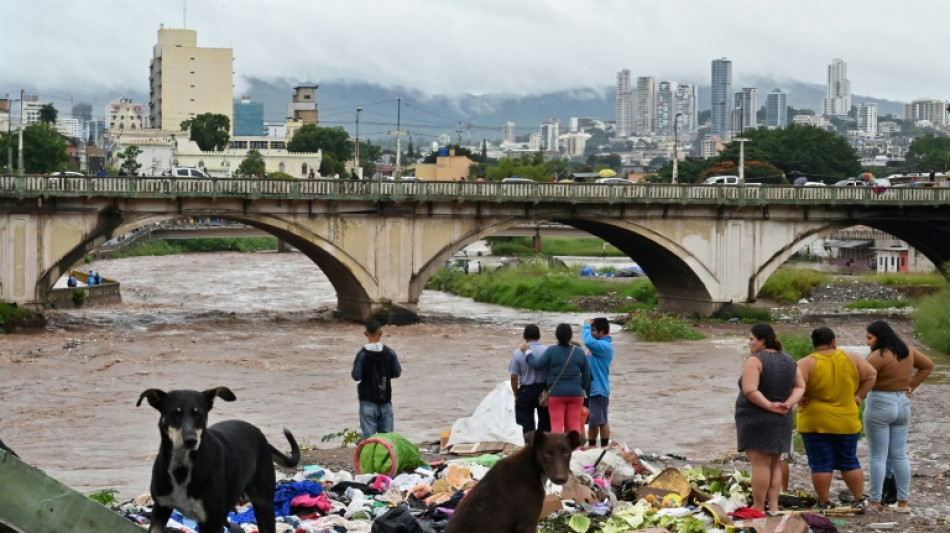
-
 Machado's close ally released in Venezuela
Machado's close ally released in Venezuela
-
Dimarco helps Inter to eight-point lead in Serie A

-
 Man City 'needed' to beat Liverpool to keep title race alive: Silva
Man City 'needed' to beat Liverpool to keep title race alive: Silva
-
Czech snowboarder Maderova lands shock Olympic parallel giant slalom win

-
 Man City fight back to end Anfield hoodoo and reel in Arsenal
Man City fight back to end Anfield hoodoo and reel in Arsenal
-
Diaz treble helps Bayern crush Hoffenheim and go six clear

-
 US astronaut to take her 3-year-old's cuddly rabbit into space
US astronaut to take her 3-year-old's cuddly rabbit into space
-
Israeli president to honour Bondi Beach attack victims on Australia visit

-
 Apologetic Turkish center Sengun replaces Shai as NBA All-Star
Apologetic Turkish center Sengun replaces Shai as NBA All-Star
-
Romania, Argentina leaders invited to Trump 'Board of Peace' meeting

-
 Kamindu heroics steer Sri Lanka past Ireland in T20 World Cup
Kamindu heroics steer Sri Lanka past Ireland in T20 World Cup
-
Age just a number for veteran Olympic snowboard champion Karl

-
 England's Feyi-Waboso out of Scotland Six Nations clash
England's Feyi-Waboso out of Scotland Six Nations clash
-
Thailand's pilot PM lands runaway election win

-
 Sarr strikes as Palace end winless run at Brighton
Sarr strikes as Palace end winless run at Brighton
-
Olympic star Ledecka says athletes ignored in debate over future of snowboard event

-
 French police arrest six over crypto-linked magistrate kidnapping
French police arrest six over crypto-linked magistrate kidnapping
-
Auger-Aliassime retains Montpellier Open crown

-
 Lindsey Vonn, skiing's iron lady whose Olympic dream ended in tears
Lindsey Vonn, skiing's iron lady whose Olympic dream ended in tears
-
Conservative Thai PM claims election victory

-
 Kamindu fireworks rescue Sri Lanka to 163-6 against Ireland
Kamindu fireworks rescue Sri Lanka to 163-6 against Ireland
-
UK PM's top aide quits in scandal over Mandelson links to Epstein

-
 Reed continues Gulf romp with victory in Qatar
Reed continues Gulf romp with victory in Qatar
-
Conservative Thai PM heading for election victory: projections

-
 Vonn crashes out of Winter Olympics in brutal end to medal dream
Vonn crashes out of Winter Olympics in brutal end to medal dream
-
Heartache for Olympic downhill champion Johnson after Vonn's crash

-
 Takaichi on course for landslide win in Japan election
Takaichi on course for landslide win in Japan election
-
Wales coach Tandy will avoid 'knee-jerk' reaction to crushing England loss

-
 Sanae Takaichi, Japan's triumphant first woman PM
Sanae Takaichi, Japan's triumphant first woman PM
-
England avoid seismic shock by beating Nepal in last-ball thriller

-
 Karl defends Olympic men's parallel giant slalom crown
Karl defends Olympic men's parallel giant slalom crown
-
Colour and caution as banned kite-flying festival returns to Pakistan

-
 England cling on to beat Nepal in last-ball thriller
England cling on to beat Nepal in last-ball thriller
-
UK foreign office to review pay-off to Epstein-linked US envoy

-
 England's Arundell eager to learn from Springbok star Kolbe
England's Arundell eager to learn from Springbok star Kolbe
-
Czech snowboard great Ledecka fails in bid for third straight Olympic gold

-
 Expectation, then stunned silence as Vonn crashes out of Olympics
Expectation, then stunned silence as Vonn crashes out of Olympics
-
Storm-battered Portugal votes in presidential election run-off

-
 Breezy Johnson wins Olympic downhill gold, Vonn crashes out
Breezy Johnson wins Olympic downhill gold, Vonn crashes out
-
Vonn's Olympic dream cut short by downhill crash

-
 French police arrest five over crypto-linked magistrate kidnapping
French police arrest five over crypto-linked magistrate kidnapping
-
Late Jacks flurry propels England to 184-7 against Nepal

-
 Vonn crashes out of Winter Olympics, ending medal dream
Vonn crashes out of Winter Olympics, ending medal dream
-
All-new Ioniq 3 coming in 2026

-
 Takaichi wins big in Japan election, media projections show
Takaichi wins big in Japan election, media projections show
-
New Twingo e-tech is at the starting line

-
 New Ypsilon and Ypsilon hf
New Ypsilon and Ypsilon hf
-
The Cupra Raval will be launched in 2026

-
 New id.Polo comes electric
New id.Polo comes electric
-
Iran defies US threats to insist on right to enrich uranium


Climate finance's 'new era' shows new political realities
Rich countries' promise of $300 billion a year in climate finance brought fury at talks in Baku from poor nations that found it too paltry, but it also shows a shift in global political realities.
The two-week marathon COP29 climate conference opened days after the decisive victory in the US presidential election of Donald Trump, a sceptic both of climate change and foreign aid.
In the new year, Germany, Canada and Australia all hold elections in which conservatives less supportive of green policies stand chances of victory.
Britain is an exception, with the new Labour government putting climate high back on the agenda, but in much of the West, concerns about inflation and budgetary shocks from Russia's invasion of Ukraine have dented enthusiasm for aggressive climate measures.
At COP29, Germany and the European Union maintained their roles championing climate but also advocated a noticeably practical approach on how much money historical polluters should give poorer countries.
"We live in a time of truly challenging geopolitics, and we should simply not have the illusion" otherwise, European climate commissioner Wopke Hoekstra told bleary-eyed delegates at COP29's pre-dawn closing session Sunday, as activists in the back loudly coughed to drown him out.
But he vowed leadership by Europe, hailing COP29 as "the start of a new era for climate finance".
German Foreign Minister Annalena Baerbock, a Green party member and longtime climate advocate, called for flexibility on ways to provide funding.
Europe should "live up to its responsibilities, but in a way that it doesn't make promises it can't keep", she said.
Avinash Persaud, special advisor on climate change to the president of the Inter-American Development Bank, called the final deal "the boundary between what is politically achievable today in developed countries and what would make a difference in developing countries".
Activists say that climate funding is a duty, not choice, for wealthy nations whose decades of greenhouse gas emissions most contributed to the crisis that most hits the poorest.
This year is again set to be the hottest on record on the planet. Just since COP29, deadly storms have battered the Philippines and Honduras, and Ecuador declared a national emergency due to drought and forest fires.
- 'Creative accounting'? -
Wealthy historic emitters' promise of $300 billion a year by 2035 is a step up from an expiring commitment of $100 billion annually, but all sides acknowledge it is not enough.
The COP29 agreement cites the need for $1.3 trillion per year, meaning a whopping $1 trillion a year needs to come from elsewhere.
Even within the $300 billion commitment, some activists see too much wiggle room.
"It is, to some extent, almost an empty promise," said Mariana Paoli, the global advocacy lead at London-based development group Christian Aid.
She described the target as "creative accounting", saying there was not enough clarity on how much money would come from public funds and in grants rather than loans.
She acknowledged the politics of the moment but said that wealthy nations had options such as taxation on fossil fuel companies.
"There is a backlash because there is no political will," she said.
- Role for multinational banks -
In one closely scrutinised part of the Baku deal, countries will be able to count climate finance through international financial institutions toward the $300 billion goal.
The text states that it is "voluntary" -- potentially opening the way to include China, which is the world's largest emitter but refuses to have requirements like long-developed countries.
In a joint statement at COP29, multilateral development banks led by the Washington-based World Bank Group but also including the Beijing-based Asian Infrastructure Investment Bank -- which has long faced US criticism -- expected that they together can provide $120 billion annually in climate financing and mobilise another $65 billion from the private sector by 2030.
Melanie Robinson, director of the global climate program at the World Resources Institute, said there were good reasons to rely on multinational development banks, including how much capital they can leverage and their tools to advance green policies.
"They are the most effective way to turn each dollar of finance into impact on the ground," she said.
She agreed that the $300 billion was insufficient but added, "It's a down payment on what we need."
Beyond the debate on dollar figures, she pointed to an initiative within the G20 by Brazil, which holds COP30 next year, to reform financial institutions so as to incorporate debtor nations as well as climate concerns.
"There is really a much bigger opportunity for us -- which is shifting the whole financial system," she said.
P.AbuBaker--SF-PST




